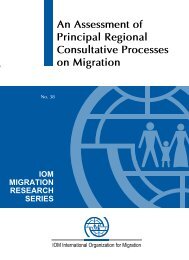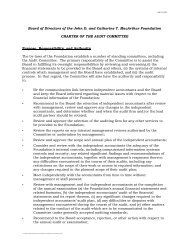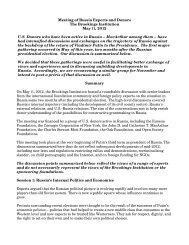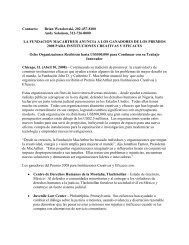A Global Compact on Learning - Brookings Institution
A Global Compact on Learning - Brookings Institution
A Global Compact on Learning - Brookings Institution
Create successful ePaper yourself
Turn your PDF publications into a flip-book with our unique Google optimized e-Paper software.
d<strong>on</strong>ors spent at least 60 percent of their aid<br />
to educati<strong>on</strong> at the basic level, it would produce<br />
another $2.2 billi<strong>on</strong>. 258 This increased<br />
funding should be used to improve learning<br />
for all, particularly for the most marginalized,<br />
such as poor girls and c<strong>on</strong>flict-affected<br />
young people, by investing in early childhood<br />
development; literacy and numeracy<br />
in the lower primary grades; and relevant<br />
post-primary opportunities. At a minimum,<br />
$3 billi<strong>on</strong> of this should be channeled<br />
annually to the FTI’s EFA pooled fund, with<br />
designati<strong>on</strong>s for the three priority areas of<br />
funding listed above.<br />
Acti<strong>on</strong>s for the Business Community and<br />
Civil Society<br />
Foundati<strong>on</strong>s, corporati<strong>on</strong>s, NGOs, research instituti<strong>on</strong>s,<br />
teachers uni<strong>on</strong>s and parent and community<br />
groups all are important actors in ensuring that<br />
the goal of learning for all is translated into acti<strong>on</strong>.<br />
They all should play an important role in advocating<br />
vis-à-vis governments and multilateral instituti<strong>on</strong>s<br />
to prioritize and invest in learning for all; in<br />
m<strong>on</strong>itoring progress and holding governments accountable<br />
for their commitments; and in investing<br />
in innovative approaches and effective evaluati<strong>on</strong>s<br />
to build the field’s understanding of what strategies<br />
work to improve learning. Specific acti<strong>on</strong>s needed<br />
include:<br />
Foundati<strong>on</strong>s. Maximize their unique ability to push<br />
forward the learning agenda by collaborating with<br />
others to seed innovati<strong>on</strong>, catalyze new thinking<br />
and policy analysis, and support str<strong>on</strong>g advocates.<br />
In particular, foundati<strong>on</strong>s should:<br />
• Devote more of their resources to educati<strong>on</strong><br />
in the developing countries. There are many<br />
foundati<strong>on</strong>s around the world that support<br />
educati<strong>on</strong> globally but resource levels are<br />
relatively low. Am<strong>on</strong>g US foundati<strong>on</strong>s al<strong>on</strong>e,<br />
<strong>on</strong>ly 4 percent of internati<strong>on</strong>al giving went<br />
to educati<strong>on</strong> with 55 percent going to health<br />
and 22 percent to democracy and governance<br />
programming. 259 Foundati<strong>on</strong>s that<br />
support important issues such as maternal<br />
and child health, populati<strong>on</strong> and migrati<strong>on</strong>,<br />
food security, and ec<strong>on</strong>omic development<br />
should include improving learning for all as<br />
a necessary strategy for achieving success in<br />
these other arenas.<br />
• Devote at least half of educati<strong>on</strong> portfolio<br />
resources to improving learning for all,<br />
with a focus <strong>on</strong> reaching the marginalized,<br />
including groups such as poor girls, the disabled,<br />
and c<strong>on</strong>flict-affected young people.<br />
Grant-making strategies should include<br />
supporting <strong>on</strong>e or more of the following<br />
three priorities: early childhood development,<br />
literacy and numeracy in the lower<br />
primary grades, and transiti<strong>on</strong> to and completi<strong>on</strong><br />
of relevant post-primary learning.<br />
• Devote a minimum of 10 percent of their<br />
educati<strong>on</strong> portfolio resources to m<strong>on</strong>itoring<br />
and evaluating progress toward achieving<br />
the goals of learning for all, including<br />
capturing and sharing learning from testing<br />
promising strategies. Partner closely with<br />
other foundati<strong>on</strong>s and research instituti<strong>on</strong>s,<br />
am<strong>on</strong>g others, to leverage resources, share<br />
knowledge, and ultimately to seed innovati<strong>on</strong><br />
based <strong>on</strong> research findings.<br />
Corporati<strong>on</strong>s. Leverage their expertise in marketing<br />
and product design, as well as their direct c<strong>on</strong>necti<strong>on</strong><br />
to ec<strong>on</strong>omic opportunities in developing<br />
countries, to advance the goal of improved learning<br />
for all, including for the most marginalized. CEOs<br />
should advocate str<strong>on</strong>gly for the importance of the<br />
learning for all agenda both because a well-educated<br />
populati<strong>on</strong> is good for business but also because it is<br />
the right thing to do. Support innovative financing<br />
schemes for educati<strong>on</strong> by building <strong>on</strong> corporate expertise<br />
and global networks of employees and c<strong>on</strong>sumers.<br />
Essential to this effort is the need for better<br />
collaborati<strong>on</strong> and coordinati<strong>on</strong> with educati<strong>on</strong> actors.<br />
In particular, corporati<strong>on</strong>s should:<br />
• Devote at least half their philanthropic<br />
educati<strong>on</strong> resources to improving learning<br />
for all, including reaching marginalized<br />
groups, with a focus <strong>on</strong> <strong>on</strong>e or more of the<br />
following three priorities: early childhood<br />
development, literacy and numeracy in the<br />
A <str<strong>on</strong>g>Global</str<strong>on</strong>g> Compa c t <strong>on</strong> <strong>Learning</strong>: Taking Acti<strong>on</strong> <strong>on</strong> Educat i o n in Developing Countries<br />
C e n t e r for Universal Educat i o n at <strong>Brookings</strong><br />
52






